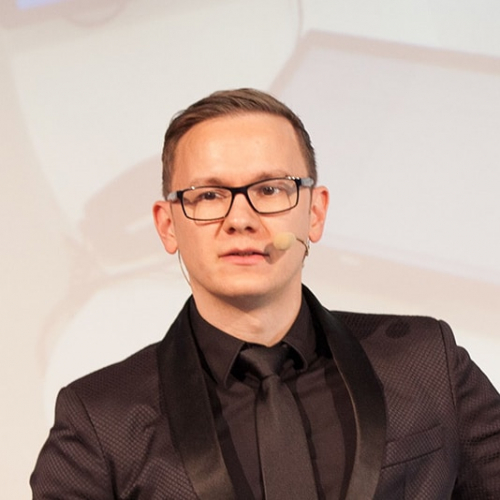Medical Futurist Dr. Bertalan Mesko im Interview
Vor einigen Wochen habe ich Dr. Bertalan Mesko, The Medical Futurist und gefragter Speaker, einige Fragen gestellt: Wie wird künstliche Intelligenz (Artificial Intelligence, kurz AI) Pharmaunternehmen beeinflussen und werden sie vielleicht irgendwann von einem „medizinischen-Space-X“ Unternehmen ersetzt werden? Außerdem: Welchen Effekt werden „empowered Patients“ auf die Sicherheit im Gesundheitswesen haben?
- Die Suche nach neuen Wirkstoffen wird durch die Anwendung von künstlicher Intelligenz drastisch beschleunigt
- Dr. Mesko ist überzeugt, um „im Spiel zu bleiben“, müssen Pharmaunternehmen die Einstellung verinnerlichen, dass sie für Patienten arbeiten
- Wenn „Healthcare-Player“ nicht digitale Lösungen für Patienten entwickeln, werden die das selbst tun – und das wird gefährlich!
How is technology in general going to affect pharmaceutical companies?
Dr. Bertalan Mesko: One technology that is quite interesting for pharma companies is 3D-printing. There is a FDA approved drug, used in epilepsy, that is being 3D-printed and it has some useful features. As for pharma companies in general, it will not change the supply chain in two years, but in the way drugs can be printed out, it is quiet revolutionary. I don’t think that it will be possible to 3D-print every drug, because in many cases chemical processes are crucial in making those drugs, and 3D-printing will not replace that. It surely is revolutionary, but regarding drugs it will take years until drugs with multiple components could be printed out. And even then, it will not replace all supply chains in pharma.
As in patient care, AI will have a massive impact for the pharmaceutical industry in the area of clinical trials, which today cost billions of dollars and take a decade to finish. With AI-based algorithms and start-ups, that try to find new drug combinations that haven’t been thought of before, Medical Trials could be taken to a whole new level. What used to take billions of dollars and a decade to analyze, AI can analyze in minutes with the help of supercomputers.
-
Bertalan Mesko Medical Futurist
What used to take billions of dollars and a decade to analyze, AI can analyze in minutes with the help of supercomputers.
There are start-ups that already analyze billions of drug models in seconds. For example, a company called turbine.AI uses deep learning algorithms and machine learning algorithms to detect new drug combinations. What took researchers a year or two, can now be achieved in one day. These technologies will not just improve current models but bring pharma to a new level doing research on a massive scale.
Apart from adapting new technologies like AI, what else has pharma to change to “stay in the game”?
Dr. Bertalan Mesko: That’s the right question: Not just to improve business models and profit, but to stay in the game at all. To anyone who works in pharma and thinks he’s irreplaceable, I would like to suggest: Look at the space industry and what happened there in only one decade. A start-up literally coming from a garage was able to change everything. Of course, I’m talking about SpaceX.
So now, even NASA is paying them to bring supply to the International Space Station and likely, they will soon fly to Mars. So, if that can happen in a single decade in an industry, that has been dominated by two major players for half a century – then it can easily happen to pharma as well.
There is one important thing pharma should have changed a while ago but hasn’t yet managed to do so: To include a patient design in all their practices. It is impossible to develop a product, a service, or a treatment without focusing on the patients and asking them what they would like to see in practice. Patient design will allow pharma to come up with products and treatments that patients would value and actually love to use. It’s certainly not enough anymore to simply produce drugs. Companies therefore need to come up with digital health solutions. Roche is a good example for this. A few weeks ago, they acquired an Austrian start-up, which developed and award-winning medical application for diabetes, called mySugar. Roche wants to use this amazing application as an additional service, providing more than the common diabetes treatment. I think that’s the right approach to stay in the game. Consequently, something has to change within pharma – a change of perspective must take place. Everyone in pharma needs to adopt the mindset: “I work for patients – not just for sales and business goals.”
-
Bertalan Mesko Medical Futurist
Consequently, something has to change within pharma - a change of perspective must take place. Everyone in pharma needs to adopt the mindset: “I work for patients - not just for sales and business goals.”
Of course, all these other aspects need to be considered as well, but we have to include patients with whatever we do and then we can start including new technologies. A cultural transformation is needed in pharma just as in healthcare. The status quo is already changing and the hierarchy within the system of physician – pharma – patient has already started to shift. Therefore patient advisory boards are so crucial. The FDA and some pharma companies already have such boards and started to include them in their internal events.
Why is it crucial, that pharma adopts the mindset of patients being the “point of care”?
Dr. Bertalan Mesko: Because if we don’t, we as healthcare players, will not stay relevant. This shift, which is a cultural rather than a technological one, is already taking place. That is, because there is no Ivory Tower of medicine anymore. I know it’s a very simple sentence, but it means that the two thousand years old status quo medicine is changing. The role of patients is changing since they need to become more proactive in their own health and disease management. The way we use technologies right now in hospitals and medical practices is shifting, and not even to the homes of patients, but to any place they go. Patients need to become the point of care themselves.
I believe that this is going to happen from the bottom up. Patients will start getting the notion that they need to do something to change the care they receive. And if part comes from the top as well, e.g. policy-makers, that’s even better. As someone working in healthcare, I can come up with a list of important business-driving forces and technological changes. But there is one thing that will be the biggest push factor of them all: If healthcare players don’t make it happen, then patients will simply try to find a solution for themselves. If there is a technological solution for their health problem, but access to it is denied, they will find a way to get it. Patients today can easily go to amazon, use social media, crowdsource or crowdfund solutions, diminishing the former monopoly of the Ivory Tower.
-
Bertalan Mesko Medical Futurist
Patients today can easily go to amazon, use social media, crowdsource or crowdfund solutions, diminishing the former monopoly of the Ivory Tower.
Just like some diabetes patients in the US. With the movement “we are not waiting” they found a way to develop their own do-it-yourself bionic pancreas system. Imagine someone telling you five years ago, that in future patients will build a sensor that connects insulin pumps to glucosensors and that their smart watch will show them how their bionic pancreas is working. That’s reality now. Hundreds of patients in the US are using such devices, which were based on DIY instructions that are available online. Due to this urgency, policy-makers need to act as soon as possible or once again risk that patients find their own solution.
But isn’t that dangerous?
Dr. Bertalan Mesko: Absolutely dangerous. I am the biggest supporter of the empowered patient movement but there is a reason why there are so many policies, privacy issues, and security measures in the healthcare industry. We need to keep products safe and regulated. That’s why we still have to prove with studies that a treatment is efficient, resting upon hundreds and thousands of patient experiences.
If we loosen this process, because patients can have access to everything, it becomes a very chaotic and dangerous world, in which anything can happen. It’s as simple and serious as that: Patients can die as a consequence of using the wrong instructions they found online. This world – even though patient empowerment is crucial and important – is going to be chaotic. Therefore, policy makers need to act faster.
For players in the healthcare system, what is the best way going forward? Neither overhype nor reject everything?
Dr. Bertalan Mesko: I’d say the best way is to have rational optimism. The way we can learn to not overhype something, is by learning more and more about the potential issues, disadvantages, and ethical considerations and by being rationally optimistic about new technologies. That’s one end of the scale, while the other would be to just reject everything, based on our human ignorance of being better than anything else. If you look at cognitive power, we can’t even compete with artificial intelligence, so the right way is to have some sort of rational optimism. Whenever someone comes up with something new, it’s definitely great to be excited about it, but at the same time, it’s crucial to await medical evidence. It’s still healthcare we’re talking about.
No matter how shiny a new technology is, if there is medical evidence behind its use, then we will keep on using it. If there is none, no matter how many billions of dollars were invested, physicians will not use it.
That’s how medicine works and that’s the reason why there are so many regulations. New technologies always have to go through traditional layers of fair quality assurance, to make sure we can use them in practice. It’s not a video game, it’s not virtual reality, we are dealing with patients‘ lives. We can’t put them at stake just because something looks shinier than another technology. I’m very glad about our traditional structure of healthcare, because it ensures that we will only keep on using approved technologies.
Dr. Mesko, thank you for your insight and your time!

Dr. Bertalan Mesko describes himself as a “proud geek”. After he got his doctorate degree in genomics, he combined his passions for technology and medicine and started a blog called “The medical Futurist.” Quickly, other social media channels on YouTube, Twitter and Instagram followed. Today Bertalan Mesko is not only a sought-after speaker but also founder of the Medical Futurist Institute, working with governments, doctors and patients to develop digital Health Technologies.
 Maßgeschneiderte Wissenslandschaften gestalten
Maßgeschneiderte Wissenslandschaften gestaltenFacharztreport 2025: Trends in Fortbildung und Kongresskultur
 Das sind die wichtigsten Trends im Healthcare Marketing 2025
Das sind die wichtigsten Trends im Healthcare Marketing 2025Analyse: Umfrage bestätigt Top-Themen der Branche
 Bundestagswahl 2025: Last-Minute-Tipps für die Entscheidungsfindung
Bundestagswahl 2025: Last-Minute-Tipps für die EntscheidungsfindungUmfrage zeigt, wie Ärztinnen und Ärzte wählen würden









Cooler Artikel. +1